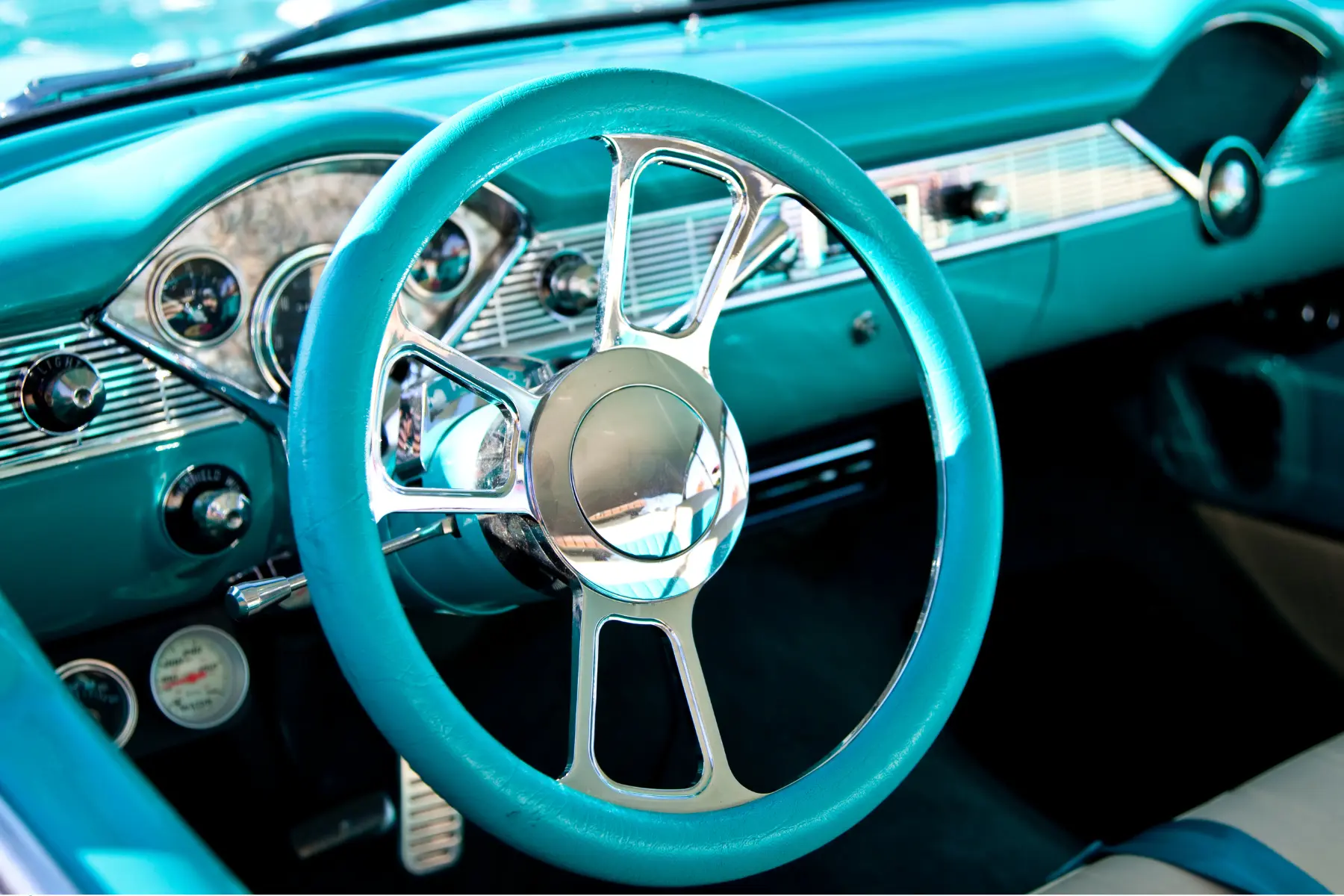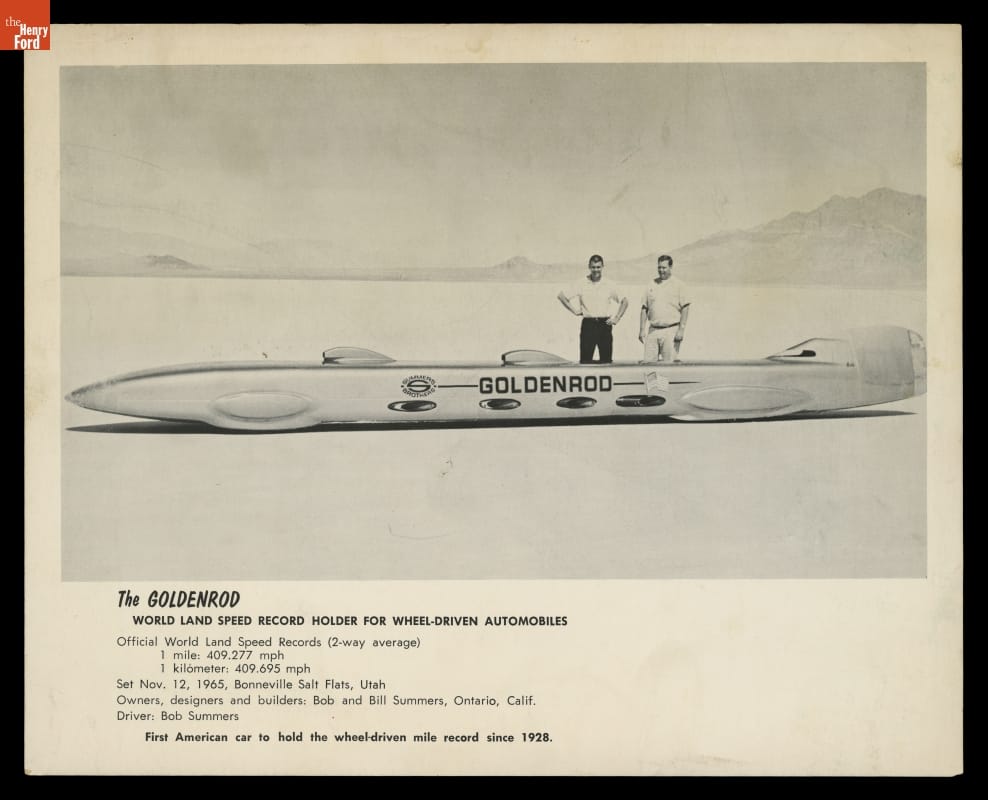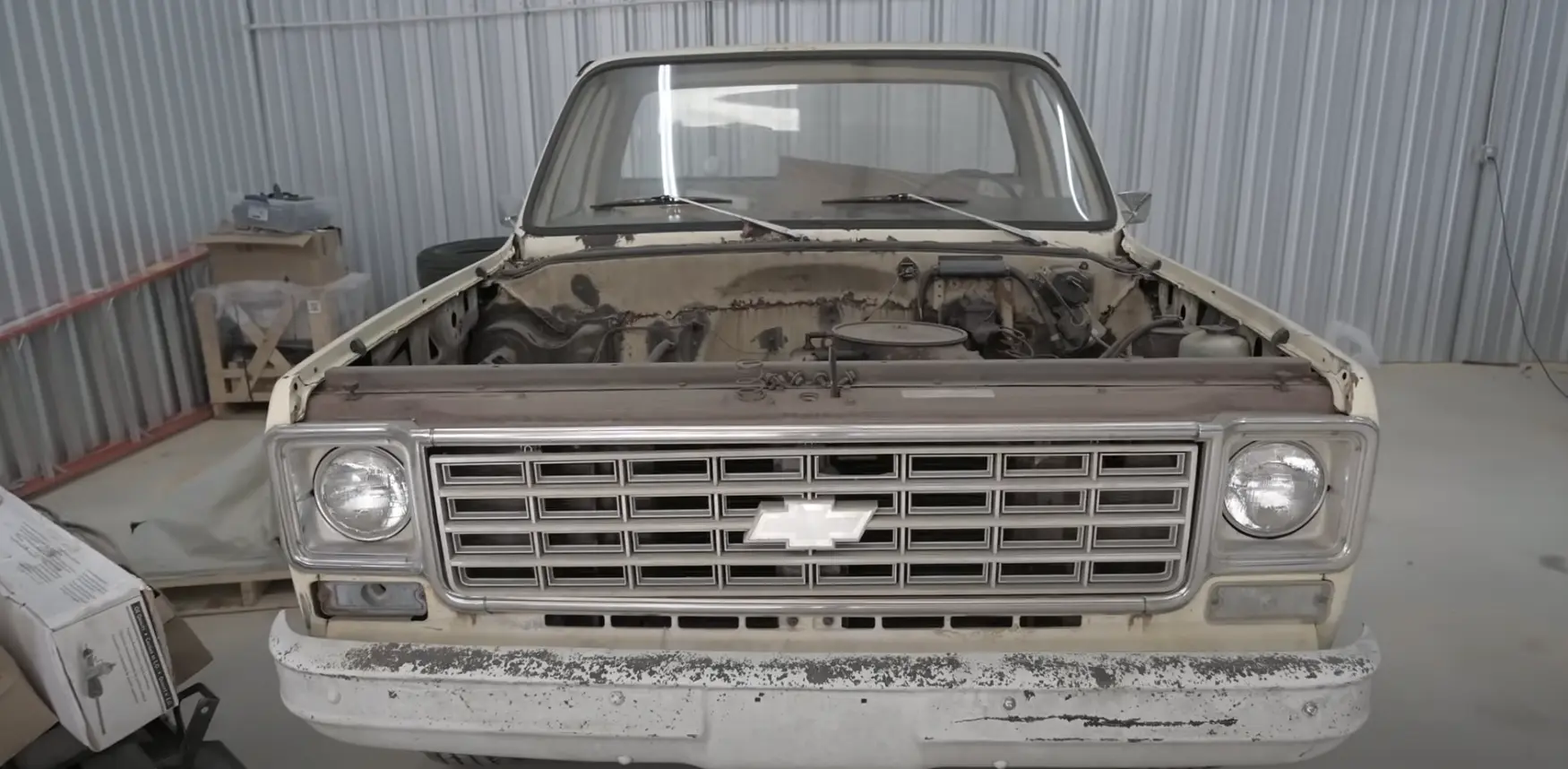“On the Road” is a podcast produced by JC Whitney. We bring you interviews with a cavalcade of figures from across the world all united by one thing: their undying love of all things automotive. The following has been edited for length and clarity.
Angel Sala-Belen sits down with Rob Mullner from EMPI, one of the top names in air-cooled parts for Volkswagens and Porsches. Mullner brings a lot of energy as he talks about EMPI’s unwavering commitment to growing their product lineup while staying laser-focused on quality and customer input. He also shares some personal stories that reveal where his deep love for cars began, offering a glimpse into the passion driving the company forward. Plus, he teases some exciting new projects on the horizon that are sure to keep car enthusiasts buzzing.
Angel Sala-Belen: Hello and welcome to JC Whitney’s On the Road. My name is Angel Sala-Belen, I’m your host, and today we are joined by Rob Mullner. How are you doing, Rob?
Rob Mullner: Good, Angel. How are you?
Angel Sala-Belen: Doing well, man. Thanks for joining us today.
Rob Mullner: My pleasure.
Angel Sala-Belen: So you work for EMPI. EMPI is a provider of air-cooled parts for Volkswagens and Porsches. Just briefly, I want to touch on some of the products that EMPI has. We have Buggy in a Box, brake kits, wiring harnesses, suspensions, and basically anything that you would need to customize your buggy, sand rail, or street car. Am I missing anything?
Rob Mullner: Carburetors, wheels, body parts, interiors. We have about 9,000 parts in our current offering, and it all started with the humble valve guide replacement. The whole company sprung from there. So if you’ve got an air-cooled Volkswagen, we’ve got virtually everything that you want or need. If you’ve got a bus, if you’ve got a Ghia, if you’re building a Baja Bug—you mentioned Buggy in a Box—JC Whitney was the first recipient of that very first Buggy in a Box because we wanted to make it super simple to get a rolling chassis on your garage floor and get it ready to drop a motor in. So, JC Whitney, thank you for being the first Buggy in a Box customer, and I think you’re going to love your buggy when it’s ready.
Angel Sala-Belen: We hear that you’re going to be whipping that thing around.
Rob Mullner: I feel obligated, yes. I feel obligated.
Angel Sala-Belen: So, first question: What does it take to keep these parts available for the customers in your community?
Rob Mullner: It is shocking and amazing how much it takes, starting with the simple idea. Joe Vittone was inspired by Volkswagen; he was a Volkswagen dealer and then became a Volkswagen builder. What he learned was Volkswagen said, “Throw those cylinder heads away when the valve guides wear out.” He said, “No, I’m not going to do that.” And from that very simple product, he expanded into killer race cars, beating big V8s at OCIR and local drag strips. So what it takes is, first off, an inspiration—why are we going to make this? Then, we’ve got an engineering and quality team that figures out what’s the right material and what it should fit. There are a lot of eras of Volkswagen Bug, with many changes. So, does it fit a ’67, which was a one-year-only car? Does it fit every Volkswagen?
The part that gets really strange and convoluted is that there are very few original Volkswagens left as they rolled off the factory floor. They’ve all been owned by 10, 12, 15 different owners, and we talked about it earlier—they all have their vision. That car has been changed literally at a nut-and-bolt level. We get feedback all the time: a customer thought their car was a ’72, but it’s really a ’67 underneath; they thought they had a 1600cc engine, but it’s really a 1500cc. You have to respect the people that really know these vehicles inside and out, and fortunately, lots of them work at EMPI. So we have inspiration, then we have technical knowledge. Then we have to figure out, can we manufacture it? Do we have a supplier that can manufacture it? Then we get a first article, check it, scrutinize it, make sure that it does all the things it’s supposed to do. Then we fit it to our own test vehicles and drive the hell out of them. Does it work? Does it look good? Does it sound good? Does it do what it’s supposed to do? And when all those boxes are checked, then we ask, “Is the market ready for it? What price should we be offering it at to our dealers?” That’s when the magic happens.
We’re at a place now where our funnel is so full, we’re launching about two new EMPI parts a week. It’s very exciting that the market is responding so well to our new parts. We touched on EVs and other forces in the automotive aftermarket space, but the reality is, the core audience really enjoys what we’re doing, and they really enjoy their Volkswagens. So it’s working out pretty well.
Angel Sala-Belen: I’m sure there are some people out there wishing and praying that a company like EMPI develops these parts to solve their issues with their Volkswagen.
Rob Mullner: We do get a lot of suggestions. Things like steering—original Volkswagen steering is a little bit vague. We searched the world for a really good steering box. We pulled them apart, tested them on our own fleet of vehicles, and after, I think, our third test fit and a couple of hundred miles of local driving, we said, “You know what? This will do the work.” We got it out to the audience, and the community responded because there were very few high-quality steering boxes available. In every other market, there’s a place where somebody’s really at the high end, which not everybody can afford. Something we strive for at EMPI is finding that middle ground. I’m not going to say we fit every budget, but we really work hard to fit the median. The steering box was right in the sweet spot, and it’s been a big success.
Angel Sala-Belen: That’s great; it sounds like you’re providing a quality product.
Rob Mullner: Right, and we touched on Porsche guys, right? Porsche guys typically have different wallets than Volkswagen guys. The reality is, they love their car just as much. It doesn’t matter what they’re sitting in; they love that car. For a Porsche guy, sometimes performance is the key, and most of them understand that performance has a larger price tag. With Volkswagens, there are so many ways to get performance, and they’re not necessarily all super expensive or capital intensive. For example, with the JC Whitney buggy, that thing weighs almost nothing. We’re going to drop a 1914 dual carb, probably dual 40s, on that. It’ll put out probably 115, maybe 120 horsepower. But in something that weighs virtually nothing, it’s going to feel like it has 500 horsepower. It will go very rapidly, and you’ll have to remember, “Oh, I need to shift gears,” because it’ll run through the RPMs very quickly.
Angel Sala-Belen: What’s the rev limiter at?
Rob Mullner: On a build like that, we’re probably looking at 4,500-5,000 RPM, but it’ll sound awesome. We built a Manx a couple of years ago, and just the sensation of winding from second into third—I would do that just because it sounds so good. I enjoyed it so much, the sounds, the smells, the vibration. You’re holding that wheel, grabbing that shifter, feeling it all because you are pretty much bolted to the chassis. All that resonance is coming through your bones. It feels spectacular.
The only downside is, I went to a Donut Derelicts show in Huntington Beach—if you know that one, it’s a beautiful show—and it was in January during a terrible cold snap. I thought, “Oh, I have a jacket, I have a sweater; I’ll be good.” I couldn’t feel my ears driving from my house to Donut Derelicts. I thought, “I hope this isn’t permanent because I can’t feel my ears; I’m not really hearing anything.” But fortunately, I stopped, got a hat and some gloves, and the ride home was much better.
Angel Sala-Belen: The amount of dedication to the community is obvious. Is there a deeper calling for the owner?
Rob Mullner: There are a hundred angles because every Volkswagen owner has a particular style and a spirit animal they’re going after. It could be a hardcore racer, or—I mean, there’s a true story—a fellow who’s even older than me, if you can believe it, built a car while he was going to Fullerton College. It was a ’67 Bug, mildly customized with a little bit of a built engine and some nice touches. This guy used this car to commute to school, go to work, meet girls—whatever. The car gets stolen, and this was decades ago, right, because this fellow is now an AARP member. But that car never left his head. He wanted to recreate that car, so we helped him put together an engine that looked and sounded like the original. He found a donor car and put it all together, and now that car is going to make its world debut at European Bug-In in Chimay, Belgium, in the EMPI booth. So everybody’s got their calling, everybody’s got their groove, and fortunately, we can help just about anyone in any way they want to go. We can help them put it together.
Angel Sala-Belen: It kind of sounds like the calling is being the supplier for other people’s dreams.
Rob Mullner: Yeah, getting Volkswagens back on the road is kind of our thing, and like I said, there are a lot of different ways we do that.
Angel Sala-Belen: What does the future look like for EMPI in the face of an EV apocalypse?
Rob Mullner: Apocalypse is a good word. If you made it to SEMA last year or even the year before, there’s a whole section of the floor that’s all about EV. You can’t ignore it, you can’t pretend it isn’t happening, and you can’t just turn away. But EMPI loves carburetors, EMPI loves fuel injection. We do not offer an EV bug kit and don’t see one in our near future. Not to steal from Jay Leno, but if you think about your daily driver being a Rivian, Tesla, or whatever to get you to and from work, and your old Bug, Buggy, or Baja as your weekend fun car, I don’t think there’s anything wrong with that.
As much as we can debate legislature, government, and whatever else, the reality is that turning a key, pumping an accelerator, hearing the whir of the fuel pump, and hearing the squirt of fuel in the carburetor is a pretty magical sound to some people. Blip, blip, blip—turn it over and blip it a couple of times. Sure, we can Game Boy ourselves into zeros and ones all day long, but the reality is that a well-tuned internal combustion engine does a lot of good for people. I’m going to tell you that nobody needs to be on Xanax if they have a dune buggy. Turn that key, drive away, and people are waving at you, smiling at you, pointing at you. All you’re doing is driving a dune buggy, and then you roll into that pedal and you’re like, “Now I remember.” All the senses are activated.
Long way around your question, but yes, we see EVs, we know what they do, and we know what they’re for. Internal combustion is where we plant our flag. For fun, I brought one of the very first EMPI parts—a valve guide kit. There’s kind of a Warshawsky story here, right where JC Whitney came from. This guy sees people getting motor vehicles, wrapping them around posts, crashing into horse carts, and he thinks, “Are you kidding? You’re going to throw that away?” He saw an opportunity to recycle. Then Roy shows up and says, “You know what we ought to do?” And like any good father, the response was, “No, no, you’re crazy. Don’t do that, you’re going to waste your life.” Somehow, Roy takes JC Whitney to this wild aftermarket place, and our founder Joe Vittone had a similar epiphany when Volkswagen said, “Oh, just throw those cylinder heads away, we’ll get you a new one.” He said, “No, no, here’s what we can do,” and that launched EMPI. That’s where it came from.

Angel Sala-Belen: So this is the origin story?
Rob Mullner: Pretty much, yeah. To tell you how just completely nuts Volkswagen people are—in a good way—I was at a show two years ago and a guy walked up and said, “Do you know about these?” I said, “I’ve heard about them.” He said, “Do you have a set?” I said, “No.” He’s like, “Here, take them.” On eBay, Craigslist, or wherever, this kind of stuff is just catnip for hardcore Volkswagen guys. He just handed them to me and said, “Here you go.” They sit by my desk, and I look at them for inspiration occasionally and think, “Something as simple as this launched the whole company.”
Angel Sala-Belen: We’ve talked about EMPI’s past, we’ve talked about the kits you provide—you’ve got brake kits, wiring harnesses, suspensions—anything you would need for any buggy, street car, or sand rail. Is there anything in the works at EMPI that you’re excited about personally?
Rob Mullner: Oh, there’s some great stuff coming. We can talk about camshafts. EMPI got out of camshafts for a while; there were some technical issues and quality control issues. We tore all that down, burned it all, and started at square one. A camshaft, a carburetor, and an exhaust—you put those three together in the right configuration, and your 60-horsepower engine can be almost 200 horsepower if you play your cards right. For every guy that wants that screaming, crazy engine, there are lots of people that just want it mild—give me a little more. Can I get another 20% or 25% more power? The camshaft is really the key there.
EMPI was out of that market for a couple of years, and I don’t want to blame COVID, but some suppliers just fell off the map. We had to start from square one, come up with our own profiles, figure out all the metallurgy, coatings, hardness, and finally—based on all the heartache we had with camshafts before—we said, “Okay, we cannot put one foot wrong. This has got to be perfect right out of the box.” We are expecting to launch camshafts before the end of June.
Angel Sala-Belen: I’m stoked on that! So, is the JC Whitney buggy going to be choppy with the new cams?
Rob Mullner: No, no. The JC Whitney buggy is going to be—if we were having Thai food—it’s going to be very mild. It’s not going to be three-alarm spicy. It will be a buggy that will start from the seat and roll away. You want to pop the clutch and make it scream? It’ll do that. I’ll personally verify it can jump over some things, but it’s going to be a very mild build. It’s not going to have a lumpy cam; nobody’s going to confuse it with, “Hey, will that thing do some wheelies?” I mean, if you really put your mind to it, probably, but not out of the box.
Angel Sala-Belen: That’s cool. I like mild vehicles anyway.
Rob Mullner: A dune buggy is so light already that you really only have to think about it lightly, and you can kick that tail out. You know, don’t tell anybody’s bosses, but they are very nimble. That wheelbase is very short, so it is ready to do outlandish parking lot activities when you want it to. Or if there’s some sand around, you can have a very good time. I can personally attest to it.
Angel Sala-Belen: Weekend cars—let’s go all the way, pedal to the metal. But throughout the week, I’m trying to keep it regular and mild. I’m glad EMPI has the full range for their customers. Now we’re going to change gears a little bit and talk about you. Do you have a defining moment in your life in a car specifically that led you to this career path of working for EMPI?
Rob Mullner: So when I was a kid, probably five or six years old, my dad was all about Studebakers. Some of the audience listening or watching probably remembers Studebakers, but my dad had a Gran Turismo Supercharged—the whole kit and caboodle. He was a machinist, so he made some of his own parts. I remember thinking, “This is pretty cool.” I didn’t know anything about anything—I’m five years old, I’ve got a buzz haircut, we’re at a stoplight, and I think maybe there was a race about to happen. I remember my dad kind of blipping it, and then just flames shooting out the hood. I thought, “That’s really cool! Is that supposed to happen?”
Because my dad was always prepared, there was a fire extinguisher. He popped the hood, hit it with the extinguisher, and just got back in the car, and we drove away. I thought, “Yeah, that’s normal, no big deal.” That kind of presented some challenges I needed to work through—like, “Is that supposed to be standard?” When you’re five years old, you’re not asking about fires, whether we were in danger, or if something bad was going to happen—would the car explode? All that came to me later, like, “Hey, that could have been pretty catastrophic.” But the way my dad played it off was very, “Oh yeah, no big deal.”
There have been a few events like that with my two daughters where they’re in the car, and maybe we got pulled over by the police or something like that, and I just acted like, “Yeah, that was no big deal.” Every now and then, my girls bring up, “Remember that time we were in the TR6?” (I had a British car phase for a while.) “Hey, remember the time we were in the TR6 and the cop pulled us over right in front of school?” I’m like, “Yeah, I remember that,” and then we just talk about the next subject. So, that first Studebaker moment was probably a defining moment. There were a few other racetrack events I can think of where I thought, “Oh, this could be pretty cool,” and then realized a lot of talent, time, and money were required—things I didn’t have. So I put that off to the side, but everybody should go to a good driving school. If you want to go off-road or on-road, I can’t recommend it enough.
Angel Sala-Belen: You have a driving school you want to plug?
Rob Mullner: It’s called DirtFish. The guys at DirtFish—you can drive a manual, you can drive an automatic, you can drive an all-wheel-drive car. I believe they still do front-drive there. The nicest people, beautiful scenery—it’s outside of Seattle. The way they have modularized their track and course adds layers, and as you start to get good at the different techniques—which are totally different from road driving—it took me days to wrap my brain around it. But everybody should go to a school—either go to DirtFish or a school like DirtFish.
Angel Sala-Belen: Awesome! So, last question—how can people stay in touch with what EMPI is doing and get in contact with you if they want to reach out?
Rob Mullner: We have been all over social media. I have to say thank you so much to the audience that’s really responded to what we’re doing on Instagram and YouTube. So, EMPI_Inc on Instagram, EMPI_Inc on YouTube—we make it easy for you. Our audience has grown about 3,000% over the last couple of years, and what I love about that is these are all people that truly enjoy the subject matter. We’re not spending a ton on advertising, so the people that are following and liking must actually enjoy the content.
I’m personally at a lot of Volkswagen events. I mentioned Chimay, Belgium—this European Bug-In is one of the biggest events every two years, so I’ll be at that. I’ll be at the EMPI open house, Bug-Ins, drag days—all over California. I work hard to get out to see dealers around the country. We do dealer visit videos so people can follow along. We’re so spoiled living in Southern California—there are so many EMPI dealers. EMPI started here, is based here, grew here.
I just got a message from one of our dealers in Oklahoma: “When are you coming out to our big event?” A guy in Colombiana, Ohio—Jim’s Custom VW—said, “Hey, you’ve got to come to our 35th Anniversary.” Yes, Jim, I’m coming to your 35th Anniversary on July 19th, I believe it is. So if people want to follow along—go buy a Volkswagen. Get your Volkswagen out of the garage—the one that’s been under a cover with Christmas decorations piled on top of it for the last 15 years. Take all that junk off, pull it out into the light, figure out what it really needs, and find an EMPI dealer.
What I’ve been constantly overwhelmed with is the average EMPI dealer. Yes, they want to sell you some parts because it’s capitalism, but they want to help you get your car on the road.
Angel Sala-Belen: Yeah, that’s what I feel with EMPI and the energy—it’s really centered around getting your classic car, your air-cooled Volkswagen or Porsche, right back on the road so you can enjoy it again.
Rob Mullner: Yeah, people forget. You know, we talked about that key turn and the whir of the pump—if you’ve got an electric pump, a couple of blips to get some gas in there, and then getting that going. When people remember what that sensation feels like, and then they roll the window down and drive away, it just hits them again. It’s like, “Oh, that’s right—that’s why I love this.” I don’t mean to besmirch anyone, but I don’t know that your Tesla gives you that sensation. I don’t know that it fills your senses with all those different kinds of experiences. I know it doesn’t—I rented a Tesla once, so I know it doesn’t. But getting that old car on the road and remembering why—and if you’ve got a family story connected, or a friend or neighbor that car came from—I’m not going to say time machine, but kind of time machine.
Angel Sala-Belen: I’m all for it. EMPI’s great—if you don’t know, EMPI is the company for you to get all of your air-cooled products for your Volkswagen and Porsche.





